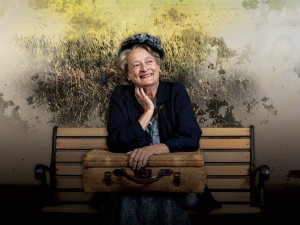The Trip to Bountiful, Ford's Theatre, Washington, DC
The Trip to Bountiful is one of several plays by Pulitzer Prize-winner Horton Foote that document lives of ordinary people in or from small Texas towns in the 1900s. (Foote also won Oscars for his screenplays of “To Kill a Mockingbird” and “Tender Mercies.”) Currently at the historic Ford's Theatre, the play is perfectly suited for Ford’s intimate space in this well-crafted production.
Mrs. Carrie Watts is miserable in her current circumstances.
An energetic woman of advanced years, she shares a tiny Houston apartment in
the years after World War II with her son, Ludie, and his shrewish wife, Jessie
Mae. Everything that Carrie does, from her hymn singing to her “running”
through the apartment, grates on Jessie Mae. Ludie tries to keep things
peaceful, but he is now decidedly more his wife’s husband than his mother’s
son. Any peace between them is bound to be fragile and, ultimately, short-lived.
If only. If only Carrie can get back to Bountiful, the small
town on the southeastern Texas coast she left 20 years earlier. She believes
she can reclaim some of the happiness that was hers, if she can just get there.
She has tried before by train, but never made it very far before Ludie and
Jessie Mae caught up with her and returned her to the Houston apartment. Even
so, she has never given up, so when the time is right and with her pension
check hidden from Jessie Mae, she strikes out once again for Bountiful, this
time by bus.
The play follows Carrie as she makes her trip to the town
whose name belies what is now there. First, no one at the bus station seems
able to locate it – and for good reason: what once may have been a bustling
town has been deserted. Carrie will not be dissuaded. She knows that Ludie and
Jessie Mae will be in pursuit. A kindly fellow passenger helps her elude them
in the Houston bus station. The passenger bonds with Carrie during the shared
leg of their trip as Carrie shares her memories of Bountiful. Despite several
travails along the way and thanks to the kindness of several she encounters,
she eventually reaches her destination. Ludie and Jessie Mae arrive shortly
thereafter. We know that there will be a return to her miserable existence in Houston,
but for a few moments, at least, she was “home.”
Carrie Watts is a powerful role that has attracted great
actresses: Lillian Gish originated the role in 1953, Geraldine Page won an
Oscar for the 1995 film, Lois Smith won awards for an off-Broadway production
in 2005, and Cicely Tyson won a Tony for the 2013 Broadway revival. In the
current production, Nancy Robinette proves herself worthy of being in their
company. Her characterization of Carrie is as unwavering as Carrie’s pursuit of
her goal. The best compliment I can give her is that she is “real.” This is one
of the most unmannered, natural performances and indelible characterizations I
have seen. We know who Carrie is and cannot help but find even her disturbing
habits somehow endearing. Ms. Robinette is a gem giving a tour de force
performance.
Joe Mallon as Ludie is a man who has been beaten down by
life. Despite being eternally caught in the conflicts between his mother and
his wife, he keeps going. Kimberly Gilbert as Jessie Mae is immediately recognizable
as a character, even if the character is written (and played) as a bit of a
caricature. There is, however, a reason that caricatures exist: sometimes they
are accurate. Thelma, Carrie’s fellow passenger on the bus for part of the
journey, is played sympathetically by Emily Kester.
The play begins in the small, cramped apartment of Ludie and
Jessie Mae, realistically created by designer Tim Mackabee and emblematic of
the oppressiveness Carrie is anxious to escape. The remainder is played out primarily with
isolated items suggesting locations but also providing space that Carrie has
been missing. Costumes by Ivania Stack and lighting by Rui Rita contribute to
the mood. Sound design and original music by John Gromada enhance the
production.
Director Michael Wilson and the entire company and crew
deserve credit for making this particular “trip” memorable and meaningful.




Comments
Post a Comment